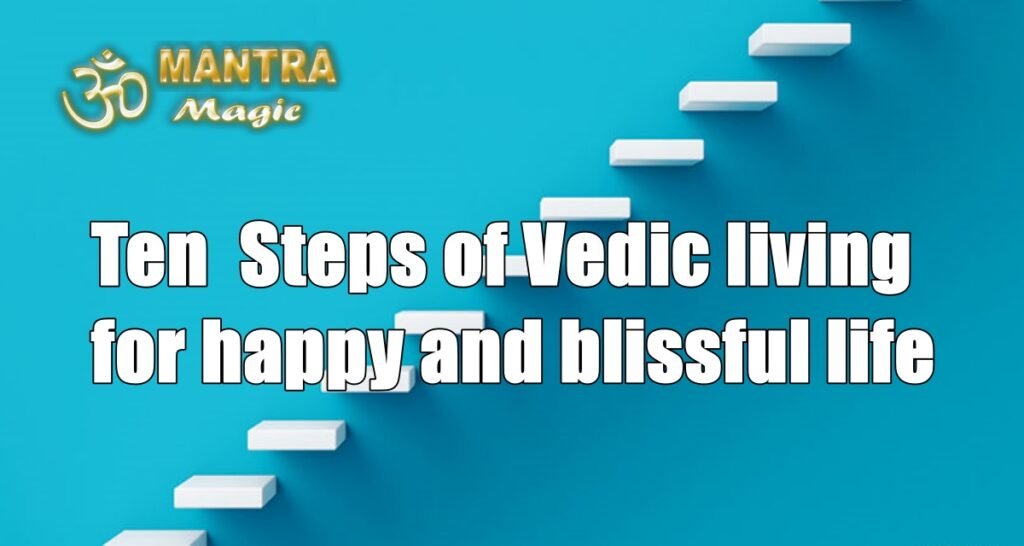Here ten steps are given in the Vedic literature for a happy and blissful life. If we literally follow these paths, we will be able to reduce the unnecessary complications and can have a smooth and wonderful life.
1) Hri or Remorse:
Living with Arrogance doesn’t have any place in Vedic living. One must clear his/her conscience by correcting the mistakes committed throughout the day. Hurting others through actions and deeds should be amended by a sincere apology. Clearing the baggage of misdeeds before sleeping is the best way to lead a happy life.
2) Santosha or Contentment :
Being grateful for all the blessings in form of health, wealth, family and friends is a step towards being internally happy. If you are content and satisfied with life, only then you can make your surroundings happy.
3) Dana or Giving:
Giving need not be only in the material form. Spreading your knowledge, happiness and spirit can also be one way of giving. Donating wealth, food, clothes to the needy is the best form of service to humankind.
4) Astikya or Faith:
There is no place for doubt and suspicion in faith in God. Having absolute faith and trust in God and scriptures, written by our scholarly ancestors, is your path to attain enlightenment.
5) Ishvarapujana or Worship:
Connect your inner self with God through prayers and meditation. Learn some basic chants and mantras. Give a heartfelt devotion to the supreme to fulfill all desires and wishes.
6) Siddhanta Shravana or Scriptural Listening:
Ancient Hindu texts like Vedic literature, Upanishads, Bhagvat Gita have all the answers of the universe. Learn and, most importantly, understand the scripture for enhancing your wisdom. Remember only a wise person is successful in making his/her life worth living.
7) Mati or Cognition:
To make important life decisions, one should always go by his/her intuition and listen to the voice that comes from within. In order to do so, it is vital to develop traits of reasoning and understanding to explore the hidden truths of life. Awaken your spiritual sense by comprehending different perspectives.
8) Vrata or Sacred Vows:
Be 100% committed to sacred vows preached by our ancestors. Being fully dedicated to certain principles like marriage, monasticism, non-addiction, tithing, loyalty to a lineage, vegetarianism, or nonsmoking is the best way to lead a disciplined life.
9) Jaapa or Recitation:
Start your day by chanting mantras or holy Jaapa. Channelize all your energy in one direction while doing the chants. This is the closest you will ever connect your inner self with God.
10) Tapas or Austerity:
Practice austerity daily through penance and sacrifice. Have self-control in all stages of your lives through means of worship, meditation, and going on pilgrimages.
The Neurophysiological and Psychological Effects of Vedic Mantras on Human Mind and Body
Dr.Ashutosh Upadhyay Vedic mantras, ancient sacred sounds dating back to at least 3000 BCE, have…
Mantras: Ancient Tools for Inner Transformation and Healing
Dr.Ashutosh Upadhyay Mantras are not mere strings of words or rhythmic sounds; they are profound…
Beeja Mantras and the Seven Chakras in Hatha Yoga
Dr. Ashutosh Upadhyay In Hatha Yoga, beeja mantras (“seed” mantras) are single-syllable sounds used to…
Meditation Techniques: Different Approaches to Om Mantra Meditation
Dr.Ashutosh Upadhyay Meditation, an ancient practice rooted in various cultural traditions, has gained immense popularity…
Om and Yoga Practice: Enhancing Your Spiritual Journey Through Sound
Dr. Ashutosh Upadhyay The practice of yoga is not just a series of physical postures;…
Historical Significance: The Origins of the Om Mantra in Ancient Texts
Dr. Ashutosh Upadhyay The Om mantra, a sacred syllable in the spiritual practices of Eastern…







